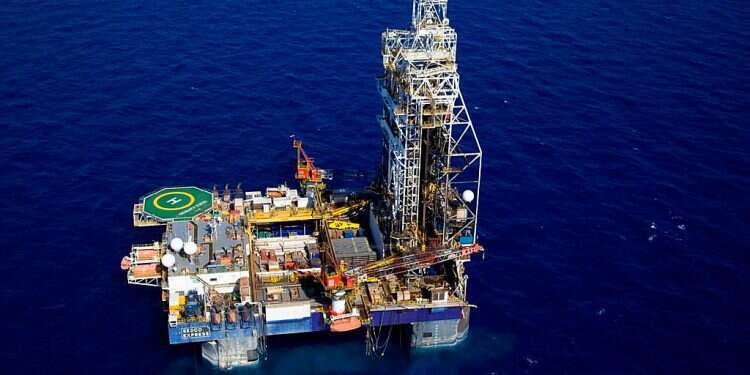While the world is at the peak of the financial crisis, which stems – among other reasons – from the jump in commodity prices, there are also those who are profiting big time from the situation: the energy companies. The increase in natural gas prices around the world has given a boost to the activities of the NewMed Energy partnership, formerly Delek Drilling, under the ownership of Yitzhak Tshuva. NewMed Energy holds around 45% in the Leviathan field.
Follow Israel Hayom on Facebook, Twitter, and Instagram
No less important than the issue of profitability, it's recently become clear that gas companies are enjoying a clear improvement in their public image. The statements from senior economic figures about how Israeli natural gas has helped to keep electricity bills low in comparison to Europe have played a key role.
The fact that politicians are fighting for credit on who's really responsible for the export of gas to Europe also sends a message to the public that it's good the gas isn't staying in the ground.
"The world economic crisis dramatically increased the importance of Israeli natural gas, not only for Israel but also on the regional level – for Jordan and Egypt. "If we hadn't made these discoveries, Israeli citizens would be paying at least 60% more for their electricity bill," Yossi Abu, CEO of NewMed Energy for the past 11 years, says in an exclusive interview with Israel Hayom.
"We see it in Europe – the price of electricity increased there by 300%, because the price of natural gas increased dramatically. In Israel, on the other hand, the price of natural gas is roughly $4.5-5 per heat unit, while in Europe and Asia it's $30. Today Israel has some of the lowest natural gas prices in the world, and this is reflected in the citizens' electricity rates."
"I see today the politicians' war for credit, and I can say one thing about it: it's clear that we did something good and big. The Tamar project brought energy independence to Israel, and the Leviathan project has become an extremely important energy anchor, which supplies gas to Israel, Jordan, Egypt and via Egypt also to Europe. In the last two years Israel gas has been reaching Europe and Asia via leakage facilities in Egypt.
"Moreover, I believe that in the coming years we will reach the state where Israel will be an extremely significant energy supplier for Europe. It's true that we won't replace the Russians, but we will be a central part of Europe's solution for its energy crisis."
Q: Aren't we too small for that?
"In 2020 Europe supplied around 150 BCM [billion cubic meters] of natural gas to Europe. If we remove from this field countries like Belarus, which are closer to Russia, we are talking about around 100 BCM. Some of this will be replaced by renewable energy, and some of it by natural gas. We expect that around 70-80 BCM will come from the world via LNG [liquified natural gas]. The main players will be the United States and Qatar, and Israel will also be there.
"To what extent? I believe that we will have between 10 and 20 BCM per year, which is no small amount of Europe's fuel basket. In the next few years, I believe we will be a very significant supplier for Europe."
Q: How can we reach these amounts?
"Today the Leviathan field produces 12 BCM and the target is to double the production. We are working on it – our entire focus in running the company is on broadening Leviathan. We also have a field in Cyprus – Aphrodite. There we can produce around 6-8 BCM. By broadening Leviathan, together with the development of Aphrodite, we can reach about 20 BCM of additional supply, and this is in order to reach a situation where within 3-5 years we will be able to bring these amounts of Israeli natural gas to Europe.
"The consumer market of LNG is mainly the European and Asian market. These markets are thirsty for LNG and we are a very attractive alternative for them. It's also because of the geographical location – close to Europe and Asia via the Suez Canal, but also because of the extremely significant reserves in Leviathan, which allow us to be a central supplier for Europe."
Q: How realistic is it – to bring a liquid gas tanker ship to Israel?
"We have taken a decisive step in planning for a liquid tanker ship, as part of which we were in contact with a Dutch company called Exmar, who are experts in the field, and we are working on planning a liquid tanker. The ship is expected to take gas from Leviathan and turn it into liquid, to store the liquid in the belly of the ship and to bring it to a ship that will take it to Europe. Our goal is to try to make the investment decision already at the end of 2023, i.e., to order the ship."
Q: How much will a ship like that cost?
"A ship like that can reach an investment of $3 billion. You have to understand that, if you take into account the royalties and the taxes, including the oil and gas profits tax, the State of Israel has received from Tamar and Leviathan more than NIS16 billion of income, and that's with the current production. If we double the production, then the State of Israel will receive billions."
Q: How much will Israel profit from exporting the gas to Europe?
"If we're talking about supplying 10-20 BCM per year of gas to Europe for 20 years – we're talking about a deal of $100 billion. The State of Israel is 50% of that, without investing anything. So we're talking here about dramatic income for the State of Israel. Natural gas is an extremely significant economic anchor."
Q: After the state already signed an agreement for exporting gas to Europe, did you start negotiations with European gas companies?
"The framework agreement is designed to provide regulatory conditions that will allow the export, but the negotiations began a long time ago. We have already been exporting to Europe via Egypt for two years. The negotiations over the big deal have been taking place for a long time with many companies in Europe, and they're advancing well. There's a strong desire that many countries in Europe – Holland, Germany, Romania, Italy and others – will connect with Israel for a long-term deal so that Israel will be a reliable and stable supplier to Europe."
Q: Won't the significant growth in the export that we have spoken about lead to a shortage of gas in Israel?
"We need to speak here about facts. The State of Israel consumes around 13 BCM of natural gas per year. If we consider the potential growth in gas consumption, then in another ten years we are talking about a maximum of 20 BCM, because in parallel the State of Israel is making efforts to introduce more renewable energy. So in the next 30 years, the State of Israel will need roughly 400 BCM, and so far in practice 1,100 BCM of natural gas has been discovered."
Q: It's true that natural gas is seen as a good alternative for coal and diesel pollutants, but it's thought of as a polluting source of energy.
"We need to stick to the facts. If we take the level of air pollution in 2012, just before we started to produce gas from Tamar, and compare it to where we are today after the production from Tamar and Leviathan – there is a drop of 70% in air pollution, despite the increase in range of electricity production. These are statistics from the Ministry for Environmental Protection. If I look at the emission of greenhouse gases, there is a decline of 30%. That is, natural gas has led to a dramatic increase in the regional quality in Israel, and not only in Israel – also in Egypt and Jordan."
Subscribe to Israel Hayom's daily newsletter and never miss our top stories!




